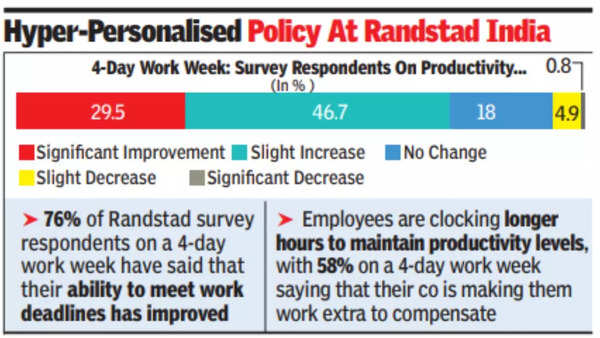[ad_1]
This is a new hyper-personalised policy at leading recruitment firm Randstad India for its business groups, with the objective of attracting teams to achieve early success by meeting their annual goals while aiming for flexibility to better reorganise their lives.
Under a four-day schedule, employees work four days per week instead of the more traditional five or six days, with the same workload. Anjali Raghuvanshi, chief people officer, Randstad India, said: “Living in a VUCA world, where rapid and unpredictable change has become the norm across industries, it is important for organisations to navigate with vision and clarity to achieve their ambitions. And, engaging today’s diverse and ambitious workforce calls for hyper-personalised approaches and initiatives to improve the overall engagement and productivity levels within the organisation.”

With the growing relevance of the need for flexibility in workplaces, conversations around the concept of a four-day work week are gaining traction in the talent community. In an employee pulse survey by Randstad, which explores their perspectives and opinions on the concept of a four-day work week and the ways it will impact their work as well as personal lives, a staggering 83% of those who are working in a traditional five-day set-up have shown interest in transitioning to a four-day work week. A majority of these respondents also believe that the transition would help improve productivity and reduce stress levels.
Of the very few companies that offer a four-day work week to employees, Beroe – a global SaaS based procurement intelligence and analytics company with a substantial presence in India – has been on a four-day work week since August 2017, which is applicable to all employees in India.
Vel Dhinagaravel, founder & CEO, Beroe, said the four-day work week was designed to tackle the twin issues of work-life balance and productivity. “Employees gain a better work-life balance with the flexibility to design their workday as they deem fit and for Beroe, which strongly believes in the philosophy of being an outcome-driven organisation, rather than measuring employees on the number of hours they put in – the four-day work week has helped in productivity improvements along with consistently positive feedback from clients,” said Dhinagaravel.
The findings of the survey also highlight certain challenges that employees anticipate if they transition to a four-day workweek. These range from coordination issues with cross-functional teams and reduced responsiveness of coworkers to potentially higher chances of burnout. 58% of the respondents on a four-day work week agreed that their company is making them work extra hours in a day in order to compensate.
[ad_2]
Source link










More Stories
India’S Growth Forecast: S&P ups India’s FY’24 growth forecast to 6.4% on robust domestic momentum
India to remain fastest-growing major economy, but demand uneven: Poll
Jack Ma: Jack Ma gets back into business with ‘Ma’s Kitchen Food’